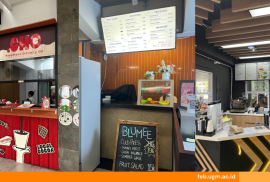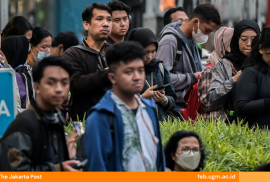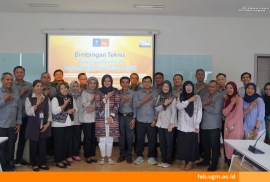Presenting a quite controversial topic related to tobacco economics, on Friday (26/11) the Department of Economics, Faculty of Economics and Business Universitas Gadjah Mada (FEB UGM) together with the Muhammadiyah Tobacco Control Center (MTCC) and the Development Studies Forum (FKP) held a Seminar and a Public Lecture (SinarKU) with the theme “Tobacco Farmers Livelihoods and Supporting Policies Amid the Excise Policy Vortex.”
This seminar presented several speakers, namely Gumilang Arya Sahadewo, as an academic from FEB UGM, and Rochiyati Murniningsih, as an academic from Muhammadiyah University of Magelang. Not only academics, in this seminar session also attended by Mr. Tuhar and Mr. Istanto as former tobacco farmers to be speakers.
The discussion at this seminar was motivated by the controversial policy of the Ministry of Finance (Kemenkeu) which affected the lives of tobacco farmers in Indonesia, moreover, tobacco’s contribution was still quite minor in GDP (around 0.3%). Therefore, it becomes a challenge for the welfare of tobacco farmers in Indonesia if there is a change in excise tax sponsored by the Ministry of Finance.
In 2020, excise duty on tobacco products (CHT) has increased by around 11% and there is a discourse that by 2022 the CHT will be increased by approximately 12.5%. Of course, this is not ideal for tobacco farmers because if we look at 2021, the dry season is colored with rain so it disrupts the amount of production and quality of tobacco produced. To mitigate the losses suffered by farmers, the Ministry of Finance implements a compensation called the Tobacco Excise Revenue Sharing Fund (DBHCHT).
The discussion began with the presentation of a research entitled “Economics of Tobacco Agriculture in Indonesia: Results of the Third Wave Survey” by Gumilang Arya Sahadewo. The urgency of this research includes the inconsistencies in the cigarette excise policy and the narrative of the negative impact of the cigarette excise policy on farmers’ livelihoods. The research method was conducted by surveying tobacco farmers in the largest tobacco-producing areas, namely East Java, Central Java, and NTB.
The results can be concluded that the income of tobacco farmers tends to be more volatile than the income of non-tobacco farmers, one of which is caused by external weather factors. In addition, tobacco farmers have to incur higher costs for agricultural inputs and so do the overall economic opportunity costs. Several policy recommendations were also conveyed, including the government needs to provide business capital through available programs and also establish financial and non-financial incentives related to the cultivation of non-tobacco crops.
Furthermore, the second discussion by Rochiyati Murniningsih complemented the previous presentation by discussing research related to the utilization of excise revenue sharing funds (DBHCHT) in Indonesia and its challenges. At the beginning of the discussion, he said that the government’s role in the welfare of tobacco farmers was not optimal due to the tobacco import policy which caused farmers’ tobacco prices to fall and the increase in cigarette excise which was the reason the cigarette industry did not buy tobacco from farmers. From the local government side, there is also no intervention to overcome the problem.
Regarding the perception of the use of DBHCHT, the reality is that the local government, in this case Magelang Regency, feels that the changing policies of the central government have resulted in confusion in the process of using it. Another problem from the farmer’s side is ignorance about the amount of DBHCHT allocation for farmers of 50%. The farmers feel that they have not received much use of DBHCHT, usually only assistance in the form of inorganic fertilizers which farmers do not even receive every year. At the end of the discussion, Rochiyati conveyed several recommendations such as the need for an evaluation of excise policies and also the need to increase the involvement/role of the government with farmers.
The event continued with a discussion session with Pak Tuhar and Pak Istanto as former tobacco farmers who discussed perceptions related to crop diversification and the development of DBHCHT from the farmers’ point of view. Pak Tuhar said that for the past 10 years most tobacco farmers have also planted various other commodities depending on the season. In fact, farmers also state that tobacco is now widely used as a side crop. Regarding the development of DBHCHT, farmers hope that DBHCHT can be utilized in accordance with the rights granted continuously every year. They also hope that there will be assistance from the local government in utilizing DBHCHT so that the results can truly improve the welfare of farmers.
Reportage: Kirana Lalita Pristy/Sony Budiarso.




